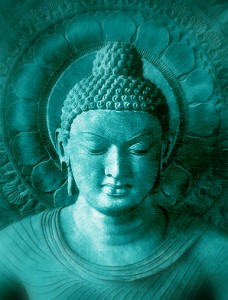“Life in Buddha Standard Time” The Huffington Post, June 4, 2011
The fourteenth-century Christian theologian and mystic, Meister Eckhart, said:
To reach the now, where one is present to oneself and to God therein, I say to you, be awake.”
 It’s so simple that it’s complicated.
It’s so simple that it’s complicated.
People often ask me: How can I make time for meditation, yoga, prayer, and retreats when there is no time? Should I get up earlier? Stay up later? Work faster or less? What about my family and relationships? How do I create spiritual space for myself?
But there’s an underlying question: How can I give anything up? When everything in our lives feels equally important we begin to burn out. Even resting doesn’t feel safe or restful.
I think it’s important to pause and consider our priorities. Everyone can make more time for themselves, however brief. Even when my life is at its busiest I remember to take a breath break, to enjoy moments of mindfulness throughout the day. I inhale, relax, exhale, center, and smile. Then, refreshed and renewed, I return to what I was doing. This is how I enter the realm of Buddha Standard Time, the wholly now, throughout each day. Each and every moment is a stepping stone to heaven, nirvana, the high ground within.
Tuning into the present, the moment, is curative, a natural medicine. It heals us because it allows us to connect to the holy now—the sacred within mundane, conventional time.
Rest is sacred. This is not a new concept. The spiritual culture of India has long understood that faster is not necessarily better; we need meaningful time to accomplish our best self’s aims and purposes. Tibetan Buddhism’s esoteric Diamond Path reveals that right now is the perfect time, right here is the perfect place, our presence is sublime, it is the perfectly appropriate teaching lesson, and each of us is the ideal person to be where we are right now. (Perhaps this last perfection is the hardest to swallow, because of the critical way we habitually see ourselves.) These are called the Five Diamond Perfections, a marvelous system of elevating how we view the world and all things in it, which can ultimately reveal the innate light of divinity, the Buddhaness or Buddha nature, in everyone and everything.
Once taking a breath break has become a part of your day, try a more advanced practice of inquiry and reflection by asking: Why do I feel that I must do what I’m doing right now? And whom am I doing it for? If you’re overwhelmed, look for the wiggle room. What can you do to make things manageable—the project, the to-do list, or the obligation—to avoid being overwhelmed? It sounds basic, but this is a life-saving practice because it greatly helps reduce the stress and tension that both wears our physical organism and enervates our energies, which is our life force and vitality.
Personally, I find it extremely helpful to focus on trying to do less and be more. This lets me leverage my time, energy, and resources more effectively, while emphasizing meaningful time and activities that matter. We can learn mindful time management through breath breaks and reflection—by returning our awareness to the present moment—one moment at a time—and catching ourselves before the busyness of our lives overwhelms and entangles us, since this so often leads to unnecessary stress and even victimization. This nowness-awareness is living in Buddha Standard Time.
Become the master of yourself and your life, rather than a victim of obligations and conditions by cultivating this process of awakening to the present, and practicing it again, and again. Carry on with this practice until it naturally and spontaneously starts to carry you. This is spiritual practice with benefits.
There is a meditator’s lesson I first encountered as a young child playing hide-and-seek, and later as a three sport athlete: The more still and focused I become—in body and mind—the more clearly I am able to see. And as I see things clearly, more and more things become clear to me. This is a manifestation of self-mastery and harmonious oneness through heightened awareness.
So what’s the most important thing? To remember to catch yourself before things catch you; to take care by staying aware; and to live free in your own time. Breath breaks, reflection, and seeing clearly are means of nowness-awareness, the ultimate therapy, freeing us from preoccupations with past and future concerns and healing our psychological conditioning and self judgment and limitations. Nirvana isn’t an esoteric concept; it is right here and now, in this very moment. Living in the present helps us to be there while getting there during every moment of each day. This is life in Buddha Standard Time.
1770 Massachusetts Ave #127
Cambridge, MA, 02140
